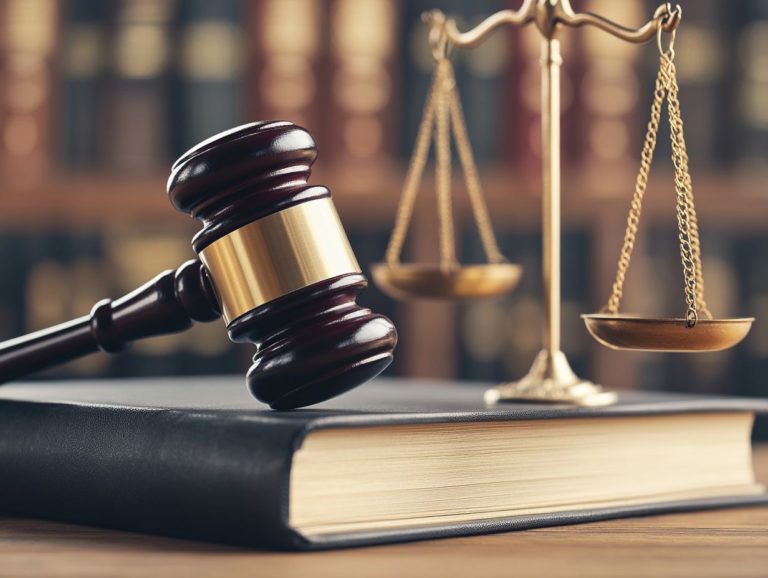Legal Consequences for Environmental Violations
Environmental violations are urgent issues that impact our planet and communities. This article covers the types of violations and the essential laws designed to protect our environment.
It highlights the importance of environmental responsibility and best practices for compliance. Understanding these concepts is crucial for fostering a sustainable future.
Contents
- Key Takeaways:
- Understanding Environmental Violations
- Laws and Regulations for Environmental Protection
- Consequences for Environmental Violations
- Preventing Environmental Violations
- Frequently Asked Questions
- What are some examples of environmental violations?
- What are the potential legal consequences for environmental violations?
- Who enforces environmental laws and regulations?
- Can individuals be held accountable for environmental violations?
- What are the consequences for businesses found guilty of environmental violations?
- Are there alternatives to legal consequences?
Key Takeaways:
Environmental violations can lead to fines and legal action. It’s vital for everyone to follow environmental laws.
Understanding these laws is crucial now more than ever!
Implementing best practices for compliance can help prevent violations and promote environmental responsibility.
Violations can have serious consequences, damaging the environment and impacting human health and the economy.
Understanding Environmental Violations
Grasping the nuances of environmental violations is essential in the fight against illegal activities that threaten human health and wildlife habitats. These violations can manifest in various ways, from pollution infractions to the improper handling of hazardous waste.
Often, they involve white-collar crimes that exploit regulatory loopholes. In the United States, the Environmental Protection Agency (EPA) plays a key role in enforcing laws and holding violators accountable under statutes like the Clean Water Act.
Definition and Types of Violations
Environmental violations are breaches of laws designed to protect natural resources and public health. These infractions can lead to legal responsibility and, in some cases, criminal charges.
Violations can primarily be categorized as pollution violations such as air and water pollution or hazardous waste mishandling. Each type carries its own consequences.
For instance, pollution violations might result in significant fines or the closure of a business. Mishandling hazardous waste can trigger severe legal repercussions, including imprisonment.
Whether you’re a corporation or an individual, following the rules is crucial. Regulatory bodies work diligently to enforce compliance to protect environmental integrity and public health.
Laws and Regulations for Environmental Protection
Laws and regulations are vital for maintaining high standards that safeguard our air, water, and wildlife habitats. The Environmental Protection Agency (EPA) is the primary enforcer of these regulations.
It operates under congressional legislation, including the Clean Water Act.
Overview of Major Environmental Laws
Major environmental laws, such as the Clean Water Act, establish the framework for EPA enforcement actions aimed at combating pollution and ensuring adherence to environmental standards.
These laws set acceptable limits for pollutants and enhance water quality nationwide. For example, the Clean Water Act aims to restore and preserve the nation’s waters for activities like fishing and swimming.
These statutes give the EPA authority to monitor and enforce compliance rigorously. Understanding the relationship between these laws and EPA regulations is essential for tackling new environmental challenges.
By fostering collaboration between state and federal entities, these laws create a strong plan to fight pollution.
Consequences for Environmental Violations
The consequences of environmental violations can be severe, ranging from hefty fines to potential criminal charges.
These repercussions depend on the intent behind the violation and the extent of the pollution. It’s crucial to navigate this landscape with care and awareness.
Fines and Penalties
Fines and penalties act as crucial deterrents against environmental violations. They are typically imposed when entities fail to comply with regulations aimed at protecting public health and natural resources.
These financial repercussions are vital for reinforcing compliance. They hold violators accountable for their actions. Take, for example, the infamous BP Deepwater Horizon oil spill. The company faced fines totaling billions of dollars due to its negligence, underscoring the severe consequences of neglecting environmental standards.
Similarly, Volkswagen encountered significant penalties for emissions fraud. This not only impacted their financial viability but also tarnished their reputation.
These instances illustrate that fines are not just punitive measures; they are essential tools for promoting responsible behavior and ensuring the preservation of our environment for future generations.
Enforcing Environmental Laws
Legal action and enforcement against environmental crime are essential for holding violators accountable. This responsibility is often led by the EPA through various enforcement actions.
Your journey begins with identifying potential violations that may arise from public complaints, routine inspections, or monitoring programs.
Once a suspected infraction comes to light, the EPA embarks on thorough investigations. They frequently collaborate with state agencies and local entities to gather strong proof. This investigative phase may involve analyzing pollution data, inspecting facilities, and interviewing witnesses.
After the findings are in, the agency can pursue several enforcement actions. These range from issuing fines to initiating legal prosecutions. Successful outcomes not only serve as a deterrent for future violations but also compel offenders to remediate the environmental damage inflicted.
This reinforces the critical importance of regulations in safeguarding public health and preserving ecosystems.
Preventing Environmental Violations
Preventing environmental violations requires adopting best practices for compliance. These practices not only align with regulations but also cultivate a culture of environmental responsibility within your organization.
By doing so, you can often offset compliance costs through initiatives such as supplemental environmental projects, which are efforts that improve the environment and help meet compliance costs.
Best Practices for Compliance
Implementing best practices to comply with environmental regulations is essential for effective pollution control. It ensures that you operate within legal frameworks while minimizing your environmental impact.
To achieve this, consider adopting a comprehensive approach that includes:
- Regular audits to assess compliance with standards set by agencies like the Environmental Protection Agency (EPA).
- Investing in training for employees on sustainable practices and the importance of waste reduction.
- Utilizing technologies that monitor emissions to provide real-time data, allowing for timely adjustments when necessary.
- Engaging with stakeholders and local communities to foster transparency and build trust, showcasing your commitment to sustainable practices.
Importance of Environmental Responsibility
Emphasizing environmental responsibility is crucial for your organization. It helps you achieve compliance, reduces long-term costs, and enhances pollution control efforts. Ultimately, this supports broader goals for environmental protection.
Taking action now can set your organization apart! By cultivating a culture that prioritizes sustainability, you can inspire both employees and stakeholders to embrace eco-friendly practices.
This proactive stance streamlines your operations and fosters a sense of ownership among your team. It drives innovation in waste reduction and resource optimization.
When you make environmental stewardship a priority, you re likely to see an uptick in public perception and customer loyalty. Such commitment can also minimize regulatory risks, ensuring that your organization meets environmental regulations and plays a pivotal role in shaping a sustainable future.
Frequently Asked Questions
Ready to take the next steps toward environmental responsibility? Start implementing these practices today and lead your organization to a sustainable future!
What are some examples of environmental violations?
Examples include illegal dumping of hazardous waste, failing to get required permits for construction, and not disposing of waste properly.
What are the potential legal consequences for environmental violations?
Legal consequences can vary based on the violation’s severity. They may include fines, penalties, or even imprisonment.
Who enforces environmental laws and regulations?
Government agencies at local, state, and federal levels enforce these laws. They conduct inspections, issue citations, and take legal action against violators.
Can individuals be held accountable for environmental violations?
Yes! Individuals, such as company executives and landowners, can be held accountable if they are directly responsible for the violation.
What are the consequences for businesses found guilty of environmental violations?
Businesses may face hefty fines, lose permits, and suffer damage to their reputation. They might also have to pay for cleanup and restoration efforts!
Are there alternatives to legal consequences?
Yes! Alternatives can include remediation efforts, community service, or implementing sustainable practices to prevent future violations.






